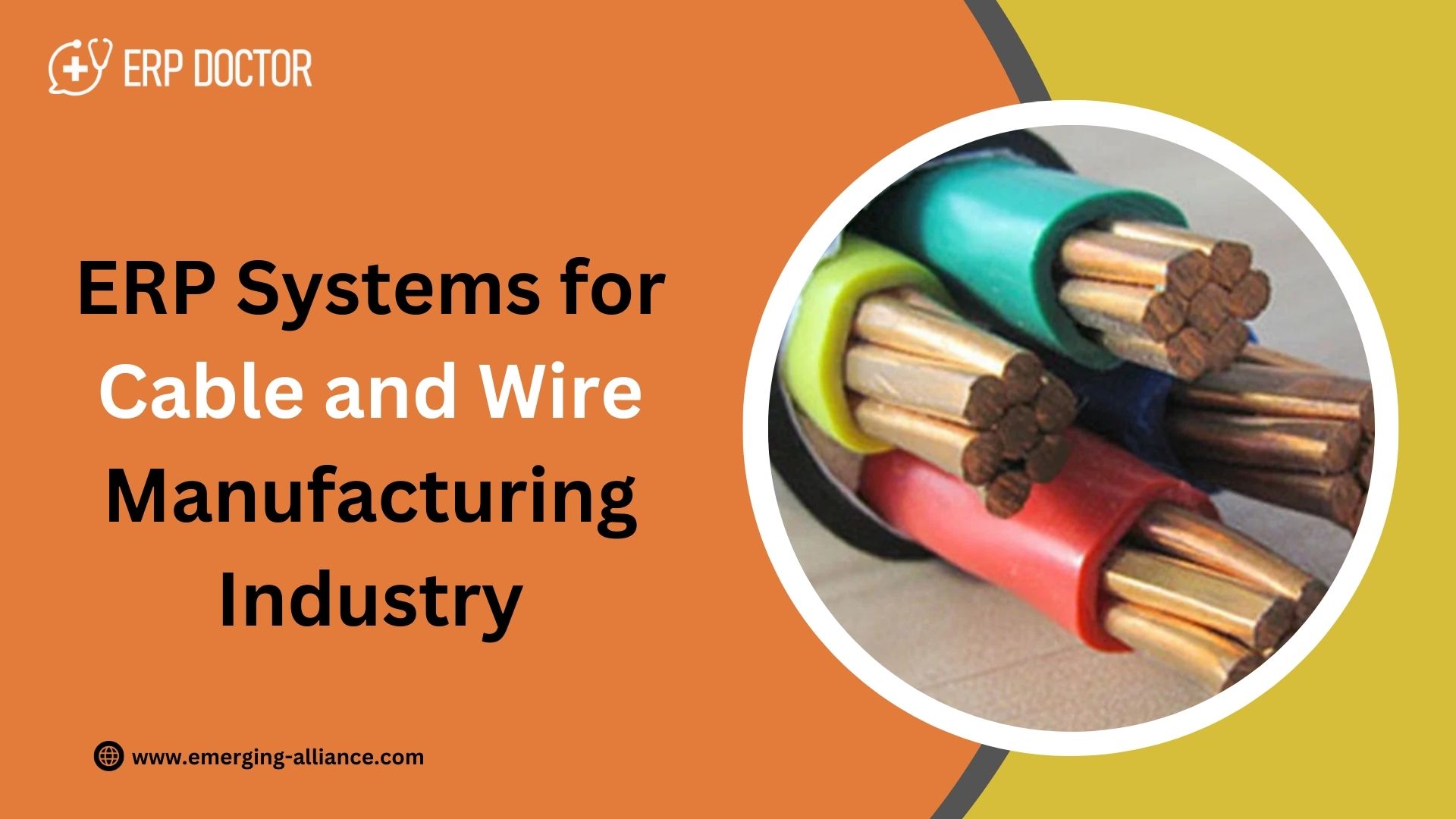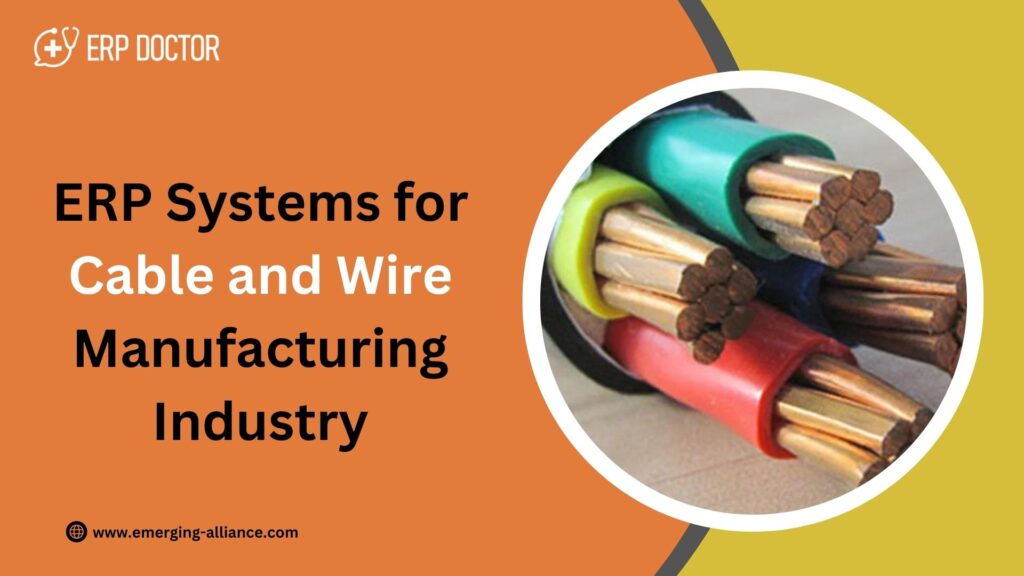
ERP Systems for Cable and Wire Manufacturing Industry

A Technical Overview: ERP Systems for Cable and Wire manufacturing industry
In the fast-paced and highly competitive cable and wire manufacturing industry, staying ahead requires more than just high-quality products. Manufacturers need to streamline operations, improve efficiency, and gain better insights into their production and business processes. This is where Enterprise Resource Planning (ERP) systems come into play. By integrating all facets of a company’s operations into a single unified platform, ERP systems can drive business success, reduce inefficiencies, and help companies better serve their customers. This technical overview explores how ERP systems specifically benefit cable and wire manufacturing industry, addressing key challenges, core features, and implementation considerations.
Understanding the Role of ERP in Cable and Wire Industry
An ERP system is a suite of integrated applications that helps businesses manage and automate critical processes like production, inventory management, procurement, sales, and finance. For cable and wire manufacturers, ERP systems provide a comprehensive solution that connects and coordinates various aspects of the manufacturing process, from raw material procurement to product delivery.
Cable and wire manufacturing is complex, with varying raw material requirements, production schedules, quality control, and regulatory compliance. An ERP system integrates these elements and provides real-time visibility into operations. It helps manufacturers track production, manage inventory, plan procurement, handle order processing, and maintain financial control, all from a centralized platform.
Key Challenges Faced by Cable and Wire Manufacturers
Cable and wire manufacturers face a unique set of challenges in their daily operations. These challenges often include:
- Raw Material Management: Managing a wide variety of raw materials such as copper, aluminum, and plastics, while accounting for fluctuations in supply and demand.
- Complex Production Processes: Cable and wire production involves several stages including extrusion, insulation, braiding, and quality testing. Managing these processes efficiently is vital for consistent product quality.
- Regulatory Compliance: Cable and wire manufacturers need to adhere to industry standards and regulations, which can vary across regions and markets.
- Inventory Management: Maintaining the right balance of raw materials and finished goods while preventing stockouts or excess inventory is a constant challenge.
- Customer Demand Variability: Demand for cables and wires can fluctuate based on economic conditions, new technologies, or specific industry requirements (e.g., telecom, automotive, construction, etc.).
An ERP system is designed to address these challenges by providing a unified approach to managing data, automating workflows, and enabling better decision-making.
How ERP Solves Industry Challenges
ERP systems help cable and wire manufacturers tackle these challenges by:
Streamlining Raw Material Management
ERP systems can track and manage raw materials and inventory in real time. This reduces waste, ensures the timely procurement of materials, and minimizes stockouts. By integrating supply chain management capabilities, ERP helps forecast material needs based on historical data, production schedules, and sales orders. For cable and wire manufacturers, this means better control over inventory levels and purchasing processes, leading to improved operational efficiency.
Optimizing Production Scheduling
An ERP system helps manufacturers optimize production schedules, track progress, and allocate resources effectively. By linking production planning with real-time inventory and order data, ERP allows for more efficient production workflows. This also helps avoid downtime, improve machine utilization, and ensure timely delivery of finished goods. In cable and wire manufacturing, where different processes (e.g., extrusion, twisting, coating) are required, scheduling optimization ensures that resources are allocated efficiently across each stage of production.
Ensuring Quality Control
Quality control is critical in the cable and wire manufacturing industry. ERP systems integrate quality management modules that ensure products meet industry standards and customer specifications. Manufacturers can track product defects, implement quality tests at different stages, and ensure that only products that meet quality requirements move forward in the supply chain. This reduces waste and rework, which improves overall profitability and customer satisfaction.
Enhancing Traceability and Compliance
ERP systems enable manufacturers to maintain complete traceability throughout the production process. This is especially important in industries that require compliance with regulatory standards such as UL, RoHS, and ISO. By logging detailed production data, including material sources, production batches, and testing results, an ERP system ensures manufacturers can easily access compliance reports and audit trails. This is crucial in preventing legal and financial liabilities and maintaining a reputation for quality and safety.
Improving Financial Management
By integrating accounting and finance modules, ERP systems give manufacturers real-time visibility into their financial health. They can track costs related to raw materials, labor, production, and shipping, and compare these against revenue to analyze profit margins. This allows manufacturers to make informed decisions about pricing, cost-cutting, and profitability. Additionally, ERP systems support compliance with financial regulations and help streamline reporting processes for tax and audit purposes.
Supporting Customer Order Management
Managing customer orders in a dynamic and fast-paced manufacturing environment can be complicated, but an ERP system helps automate the order-to-cash process. By integrating sales and customer relationship management (CRM) modules, ERP systems enable manufacturers to process orders faster, track customer preferences, and improve overall customer service. This capability improves customer satisfaction by providing accurate delivery dates, order status updates, and efficient handling of returns or complaints.
Core Features of ERP Systems for Cable and Wire Manufacturers
ERP systems tailored to cable and wire manufacturers typically include a wide range of features that address industry-specific needs:
Manufacturing Resource Planning (MRP)
MRP functionality is a crucial feature for cable and wire manufacturers. It helps in managing production resources, materials, and scheduling. By using MRP within an ERP system, manufacturers can calculate material requirements, reduce stockholding costs, and avoid production delays due to material shortages.
Supply Chain Management (SCM)
SCM functionality within an ERP system allows manufacturers to coordinate the movement of materials and products across the entire supply chain. From sourcing raw materials to shipping finished products, SCM ensures that every step in the process is synchronized, improving efficiency and reducing lead times.
Production and Shop Floor Control
The ability to monitor and control shop floor activities is key to ensuring smooth manufacturing operations. ERP systems integrate shop floor control features to track production progress, machine efficiency, and labor performance. These capabilities ensure that the production process stays on track and helps identify areas for improvement.
Inventory and Warehouse Management
An efficient inventory management system is vital for cable and wire manufacturers due to the large number of materials and products involved. ERP systems enable real-time tracking of raw materials, work-in-progress items, and finished goods across multiple warehouses. This enhances stock accuracy and helps reduce excess inventory, freeing up working capital.
Customer Relationship Management (CRM)
A CRM module integrated into the ERP system helps manufacturers manage customer relationships more effectively. It provides insights into customer needs, preferences, and buying patterns, allowing manufacturers to offer tailored products and services.
Data Analytics and Reporting
ERP systems offer advanced reporting and analytics capabilities that help manufacturers gain actionable insights into their operations. Dashboards, custom reports, and predictive analytics help manufacturers monitor key performance indicators (KPIs), make data-driven decisions, and optimize processes for better efficiency and profitability.
Implementation Considerations for Cable and Wire Manufacturers
Implementing an ERP system in cable and wire manufacturing companies requires careful planning and consideration. Here are some key steps to ensure a successful ERP implementation:
Define Objectives: Before choosing an ERP system, manufacturers need to define their objectives and identify the specific pain points they want to address, such as improving inventory management or streamlining production planning.
Customization: ERP systems must be customized to meet the unique needs of cable and wire manufacturers. This could include adding features specific to cable production processes, like extrusion scheduling or wire testing capabilities.
Staff Training: Employees need to be properly trained on the new system to ensure a smooth transition and maximize the benefits of the ERP system. Training should cover key functions such as production tracking, inventory management, and order processing.
Integration with Existing Systems: Integrating the ERP system with existing technologies such as legacy software or machinery can enhance functionality and ensure seamless workflows. Data migration should be carefully managed to avoid any loss of information.
Ongoing Support and Maintenance: Post-implementation support is essential for ensuring the continued success of the ERP system. Manufacturers should establish an ongoing maintenance plan to address any issues, updates, or changes required over time.
The ERP Advantage in Cable and Wire Manufacturing
ERP systems are transforming the cable and wire manufacturing industry by streamlining operations, improving decision-making, and enhancing customer satisfaction. By automating critical processes, providing real-time insights, and improving traceability, ERP systems help manufacturers overcome industry-specific challenges and remain competitive. As the industry continues to grow and evolve, the role of ERP in optimizing production and business processes will become increasingly important.
For cable and wire manufacturers, adopting the right ERP solution can unlock significant operational efficiencies, cost savings, and long-term business growth. However, selecting the right ERP system, customizing it to meet specific needs, and ensuring successful implementation are key factors for success.
If you’re ready to take your cable and wire manufacturing business to the next level, consider implementing ERP for cable and wire Industry today. Reach out to an ERP partner to learn more about how this powerful ERP solution can transform your operations and drive long-term success.
Visit ERP Doctor for Expert ERP Solutions and Support
Want to speak to an expert? Fill in the form below, and we will be in touch with you shortly!







